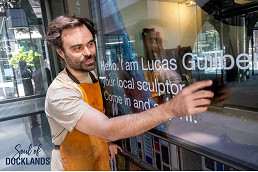E-scooters and the City of Melbourne
Stan Capp & Tom McNair
So, where do we currently stand on the use of e-scooters in our city?
The feedback that is received from many of our residents is that e-scooters are the most prevalent cause of distress when walking our streets. Let me quote from a resident of Docklands, Tom McNair who stated …
“My wife, grand-daughter and I were inches from a potentially fatal impact by an e-scooter riding at high speed on the northern footpath along Siddeley St at 9.30pm on Thursday, June 15 as we rounded the eastern corner of the former Police Headquarters in Flinders St. We felt the wind of the rider and machine as he flew past, not even slowing or stopping to see if we were injured, let alone to apologise. We screamed!”
A one-off? If you ask other street users then perhaps not. You will invariably find stories of near-misses and evidence that actual injuries and verbal interactions are increasingly common.
Clearly, there is a problem with riders chronically ignoring basic safety rules with poor helmet use, double riding, use of footpaths often at speed, riding in opposite directions on one-way streets, and, of course, random parking that obstructs access, particularly for elderly and disabled pedestrians.
My personal experience of reporting an incident with an aggressive e-scooter rider who with his co-rider narrowly missed me was to be told by Victoria Police to advise the City of Melbourne as the police had no resources to pursue any lines of enquiry. I think this is a very reasonable position and our police have many other higher priority things to do that already stretch their resources.
The obvious conclusion is that our issues with e-scooters will continue until the rules are made clear, riders are educated, and enforcement can be expected.
At a minimum, all e-scooters should be subject to geo-fencing that prohibits their use on footpaths in the same way that other areas are currently restricted e.g., the Bourke Street Mall, Carlton Gardens, etc. This is good technology that should be mandated.
Discrete areas need to be established where all e-scooters must be returned to, with appropriate penalties applied to non-compliant users.
Authority needs to be given to a workforce to fill the void unable to be met by our police that has powers to fine riders who put at risk their own personal safety and that of the public. If riders break the law, there should be a reasonable expectation that they will be prosecuted. The co-operation of the commercial operators would facilitate the identification of the rider at any designated time and date.
No surprise to me that a vote in Paris rejected the use of e-scooters and I would be pretty confident that a popular vote in Melbourne would produce a similar outcome. Maybe that’s why no-one in authority has pursued it. In the meantime, the ubiquitous e-scooter will have to be managed throughout this “trial” period.
Following his experience, Tom McNair has crystallised all these thoughts and more in his following recommendations. He states that the commercial e-scooter trial should be discontinued and not allowed to resume until:
- The e-scooter cannot be operated until the hirer has electronically agreed to use the e-vehicle in accordance with the rules governing its use, each time the scooter is hired.
- Each e-scooter employs technology that prevents it being used on footpaths.
- Each e-scooter is equipped with a safety-helmet and with technology that prevents the e-scooter being used without the helmet firstly being disengaged from an electronic clip and which can then detect when that helmet is no longer in close proximity to the vehicle – i.e., the rider must have the helmet belonging to the bike on his or her head and not discard it before the ride starts or is in progress.
- The e-scooter must be equipped with technology that ensures that the ride only ends when it is parked correctly in a designated parking zone with the helmet belonging to the vehicle re-attached to the vehicle.
- The e-scooter must be equipped with the technology that detects when more than one person is using the vehicle and disables the vehicle until a single rider is operating the machine, preventing pillion riding.
- The e-scooter must be equipped with technology that restricts the speed of the vehicle to 20kmph on permitted city streets and designated bike paths and restricts its speed to 10kph on designated shared paths and public spaces where they are allowed to operate.
- E-scooters must be fixed with lights and horns (not bells which hearing impaired cannot hear).
- E-scooters must be fixed with technology that prevents their use in parkland or other designated public places (such as Federation Square).
- The operators of the e-scooters must provide e-training in the safe use of the vehicle and the rules governing the use of the vehicle before a new user can enable the machine, with unsafe usage detected. Technology must be provided which limits the speed of vehicles to 10kmph until every hirer has completed 10 hours of safe and rule-compliant use. Technology must require that the hirer electronically agrees to abide by the terms and conditions of use before a ride can commence.
- Commercial operators of e-scooters must be required to provide e-scooter parking stations around the city in which they are allowed to operate, and a hire must start and end at a designated e-vehicle park. Each park must have signage explaining the rules for use and safe use of e-scooters and bikes. The commercial operators must be required to provide parking of their e-scooter fleets off footpaths and public places.
- The council and the commercial e-scooter operators must provide financial resources to fund employment and equipment of traffic officers or protective officers for the enforcement of rules for e-vehicle use and enforce consequences for non-compliance with meaningful penalties and fines.
- The parameters of the required technology are set out above. Commercial operators that are unable to comply must be excluded from City of Melbourne and other participating cities.
- All cities and towns that allow commercial e-scooters providers must set and maintain the same operating requirements.
Tom also supports the same standards be applied to commercial e-bikes.
Certainly, some food for thought. •

Meet Lucas Guilbert




 Download the Latest Edition
Download the Latest Edition
